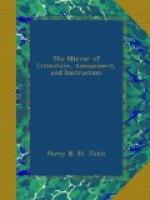At the very moment I was turning from the shore, to retrace my steps, the deep tone of a distant bell fell on my ear. It was the Curfew Bell—which had been tolled regularly at eight o’clock in the evening, since the days of the despotic William.
The vast changes that had taken place in society, in fact, in every thing, since the institution of this custom, occupied my thoughts during my walk; and I felt no little gratification in the assurance that what was originally the edict of a barbarous and despotic age, was now merely retained as a relic of ancient times.
It may be thought romantic, but the first hearing of the Curfew Bell often occurs to my memory; and there are times when I fancy myself walking on that lone shore, and the objects that I then thought so beautiful, are as distinctly and vividly seen as if I were actually there.
REGINALD.
The only drawback from the interest of this brief paper is that the writer does not state the name of the Village whence he heard the Curfew Bell.
* * * * *
BARBAROUS PUNISHMENTS.
It is almost inconceivable how long Fnglishmen have retained their barbarous practices. It is not more than a century since a trial for witchcraft took place in England, and hardly eighty since one occurred in Scotland. The crime of coining the King’s money is still treated as treason, and women, for the commission of this crime as well as that of murdering their husbands, were sentenced to be strangled, and afterwards publicly burned. In London this horrible outrage upon civilized feelings was perpetrated in Smithfield. One of these melancholy exhibitions took place within the memory of many persons. The criminal was a fine young woman, and the strangling had not been completed, for when the flames reached her at the stake, she uttered a shriek. This produced, as it well might, a general horror, and the practice was abandoned, though the law was not abrogated. It was the mild and enlightened Sir Samuel Romilly who first brought in a bill to annul the old acts which ordered the most revolting mutilation of the corpses of traitors, agreeable to a sentence expressed in the most barbarous jargon. Mark, this was only a few years since, I believe in 1811.
What must have been the taste of our forefathers, who suffered miscreants to obtain their livelihood for the moment by stationing themselves at Temple-bar, after the rebellion in 1745, with magnifying-glasses, that the spectators might more nicely discriminate the features of those unfortunate gentlemen whose heads had been fixed over the gateway. No London populace, however tumultuary, would now for a moment tolerate such an outrage upon all that is decent and humane—(From a clever letter in the Times of April 12, by Colonel Jones.)
* * * * *




